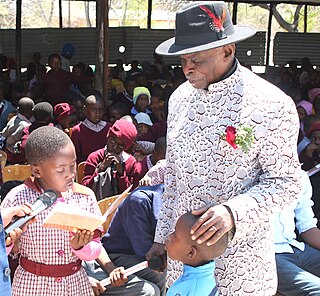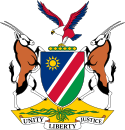
The Secretary of State for Culture, Media and Sport, also referred to as the Culture Secretary, is a secretary of state in the Government of the United Kingdom, with overall responsibility for strategy and policy across the Department for Culture, Media and Sport. The incumbent is a member of the Cabinet of the United Kingdom. The office has been dubbed "Minister of Fun".

The Ministry of Culture is the government department of Greece entrusted with preserving the country's cultural heritage, promoting the arts, and overseeing sport through the subordinate General Secretariat for Sports. The incumbent minister is Lina Mendoni. The Deputy Minister is Christos Dimas.

Nahas Gideon Angula is a Namibian politician who served as the third Prime Minister of Namibia from 21 March 2005 to 4 December 2012. He was succeeded by Hage Geingob in a cabinet reshuffle after the 2012 SWAPO Party congress. He subsequently served as Minister of Defence from 2012 to 2015.
The Ministry of Colleges and Universities is the ministry of the Government of Ontario responsible for administration of laws relating to post-secondary education. This ministry is one of two education ministries, the other being the Ministry of Education. The Ministry's offices are in downtown Toronto. The current minister is Jill Dunlop.

The Ministry of Education, Culture and Science is the Dutch Ministry responsible for education, culture, science, research, gender equality and communications. The Ministry was created in 1918 as the Ministry of Education, Arts and Sciences and had several name changes before it became the Education, Culture and Science in 1994. The Ministry is headed by the Minister of Education, Culture and Science, currently Robbert Dijkgraaf.

The European Commissioner for Innovation, Research, Culture, Education and Youth is a member of the European Commission. The portfolio was previously titled European Commissioner for Education, Culture, Youth and Sport until 2019 when it was merged with the European Commissioner for Research, Science and Innovation to form its current title.

The Namibia University of Science and Technology (NUST), formerly known as Polytechnic of Namibia, is a public university located in the city of Windhoek, Namibia. Andrew Niikondo is its acting vice-chancellor. NUST was headed by the founding vice-chancellor Tjama Tjivikua until March 2019. After two acting appointments, Erold Naomab was appointed vice-chancellor in January 2021. The largely ceremonial role of chancellor of the university is held by Peter Katjavivi.

The Royal Norwegian Ministry of Culture and Equality is responsible for cultural policy, regulations and other matters related to the media and sports, and equality and non-discrimination. The ministry was established in 1982, as the Ministry of Cultural and Science. Until then, the Ministry of Church and Education Affairs had had the overriding responsibility for cultural affairs in Norway. It is led by the Minister of Culture and Equality Lubna Jaffery (Labour) since June 2023. The Secretary-General of the ministry is Kristin Berge. The ministry reports to the Storting.

The Ministry of Federal Education and Professional Training is a federal ministry of the Government of Pakistan. The ministry's political head is known as the Minister for Education (Pakistan) | Minister of Pakistan and the ministry's bureaucratic head is the Education Secretary of Pakistan.
John Mutorwa is a Namibian politician and current a deputy prime minister and Minister of Works and Transport. A member of the South West Africa People's Organization (SWAPO), Mutorwa has served in the National Assembly of Namibia as well as the cabinet since 1992.
The Ministry of Heritage, Sport, Tourism and Culture Industries, was created on January 18, 2010 when the Ministry of Culture and the Ministry of Tourism were combined under one ministry. Sport was added to the portfolio in 2011. It is responsible for the development of policies and programs and the operation of programs related to tourism, arts, cultural industries, heritage sectors and libraries, in Ontario. The Ministry works in partnership with its agencies, attractions, boards and commissions and the private sector to maximize the economic, cultural and social contributions of its agencies and attractions, while promoting the tourism industry and preserving Ontario's culture and heritage.

The Cabinet of Namibia is an appointed body that was established by Chapter 6 of the Constitution of Namibia. It is mandated to include the following positions: the President of Namibia, the Prime Minister of Namibia and any positions that the President so appoints.

The Ministry of Science and Education of the Republic of Azerbaijan is a governmental agency within the Cabinet of Azerbaijan in charge of regulating the education system in Azerbaijan.

The government of Namibia consists of the executive, the legislative and the judiciary branches. The Cabinet is the executive organ of government, implementing the laws of the country. It consists of the president, the prime minister and his deputy, as well as the ministers of the Cabinet of Namibia. The legislative organs of government are the National Council and the National Assembly. They make the laws of the country. The judiciary organs of government are the courts. The highest court of Namibia is the Supreme Court. There are also the high courts and lower courts.

The Ministry of Education, Vocational Training and Sports (MEFPD) is the department of the Government of Spain responsible for proposing and carrying out the government policy on education and vocational training, including all the teachings of the education system except university education, without prejudice to the competences of the National Sports Council in matters of sports education. Likewise, it is also the responsibility of this Department the promotion of cooperation actions and, in coordination with the Ministry of Foreign Affairs, the promotion of international relations in the field of non-university education.

The Ministry of Education, Science, Culture and Sports of Armenia (MoESCS) is the Armenian state body of executive authority, which elaborates and implements the policies set out by the Government of Armenia in the education, science, culture, sports and youth policy sectors.

The Ministry of Higher Education is a department of the Namibian government. It was established in 1995 under the name Ministry of Higher Education and Vocational Education as a split-off from the Ministry of Education (MOE) and existed in this form until 2005 when its portfolio fell back to the MOE. In 2015 it was reestablished as Ministry of Higher Education, Training and Innovation (MHETI).

The Ministry of Sport, Youth and National Service (MSYNS) is a department of the Namibian government. It was established as Ministry of Youth and Sport in 1991 when sport was split-off from the Ministry of Education. The first minister of education, culture and sport was Nahas Angula, serving from independence in 1990. The first minister of youth and sport was Pendukeni Iivula-Ithana. The current minister is Agnes Tjongarero.

Federal Ministry of Youth and Sport Development is responsible for youths and Sports affairs with the vision "to empower Nigerian youths to becoming self-reliant and socially responsible." The Ministry is the outcome of the merger of the defunct Federal Ministry of Youth Development (FMYD) and the National Sports Commission (NSC) by the proclamation of His Excellency, Mr. President Muhammadu Buhari on the restructuring of Ministries, Departments and Agencies (MDAs) of Government on 11 November 2016. This departments focusing on enterprise development, vocational skills & training, youth voice, employment, and education. The ministry is responsible for the national youth policy, youth development programmes, funding youth activities, youth participation, and to manage the National Youth Services Corps and the Citizenship and Leadership Training Centre. The current minister of Youths and Sports Development, Dr. Jamila Bio Ibrahim.
















